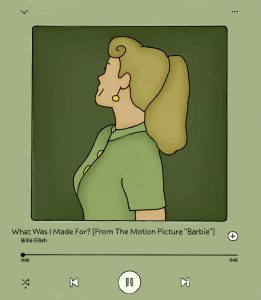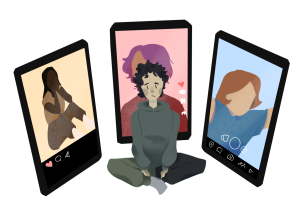Myles Fox: Why We Celebrate Black History Month
March 1, 2023
In the moment, my hands were clenched together. The swelling tears in my eyes turned my vision into a kaleidoscope of blurred motion. Quickly, I shut my eyes. I buried myself deep in the confines of my mind. When my eyes opened, I saw the crescent marks of my fingernails ingrained in the palms of my hands. Calling the attention of the teacher, I asked to be excused. From the cold metal seat in my third grade classroom, I ran. Straight to the bathroom, I ran as fast as I could as my palms became damp from wiping the tears off my face.
As a child, it was hard to hear about slavery. Every time I looked in the mirror, I could only see the sheer terror that fell across my face when I thought of the history I held within me. Slaves beaten! Whipped! Stripped of their humanity, all because of the color of their skin.
When I looked down at my hands, I wondered. I wondered if we, as a people, would forever bear the chains that our ancestors once had to on the slave ships to the Americas. In a day and age where our freedoms as people are still withheld from us, we use Black History Month to remind us of how far we have come and the work still left to be done.
During Black History Month, we are able to rejoice in the examples of Black excellence present in today’s society. Black achievements have been made across all different areas in America, from politics, to entrepreneurship, to sports and more. We as African Americans have not only worked to be included in society’s achievements, but also to be recognized as leaders in our respective fields. For example, Neil DeGrasse Tyson, is a world-renowned African American Astrophysicist. When looking at the Greatest-of-All-Time, names like Tiger Woods, Serena Williams and Michael Jordan often come up. Even recent Black history is still being made with Viola Davis winning a Grammy, earning her one of the most esteemed titles in the performance industry with an Emmy, Grammy, Oscar, and Tony: The EGOT. During Black History Month, we, as a people, have a chance to be recognized for our great influence and accomplishment in American culture.
Unfortunately, in the U.S. and in schools, our history is often portrayed as one-sided with the most prominent subject being oppression. From slavery to Jim Crow, our past seems one-dimensional, and, at first glance, the depth of our culture might go unnoticed. There are numerous examples of our culture present in today’s society, starting with the birth of hip-hop culture, an expression of the day-to-day African American experience through music. From the food we make, to the Historically Black Colleges and Universities that take center stage in Black excellence in education, Black culture stays present in society. With the media and the world around us portraying the horrors of being Black, our beauties and strengths can often find themselves overshadowed by the thick tear gas released on protesters labeled as violent and extreme on our televisions.
Black History Month is also a way to keep our history and culture alive, so that it is not drowned out by the media portrayal of African Americans. Granted, a part of why we celebrate Black History Month is ugly. The necessity for change in our country is grave. The violence that crosses your late night TV is a reflection of the pain and suffering of a history that has more often than not hindered us rather than encouraged us.
But we must not let our mark on history fade. People like Madam C.J. Walker, a former slave and the first Black woman to be a millionaire, are significant in our cultural story. As Pinewood juniors, we read “The Right Stuff”, a book about launching the first manned spaceship, and its pilot, Al Shepard, to space. Unfortunately we do not read about the first manned orbit in space wich envolved three key mathematicians required to calculate the trajectory of the aircrafts, Katherine Johnson, Dorthy Vaughan and Mary Jackson, all Black Women. This is the history that is celebrated in Black History Month, the greatness that has been a part of our identities for generations.
The most important thing about Black History Month is that it is a movement of people who are determined to overcome odds. From obtaining the right to vote, to diversifying governments and earning equal opportunity in the workplace, We have come so far in our fight for equality. Our true strength is shown not through the pain we have suffered but through the strength that it took to overcome past barriers and the current ones ahead.







